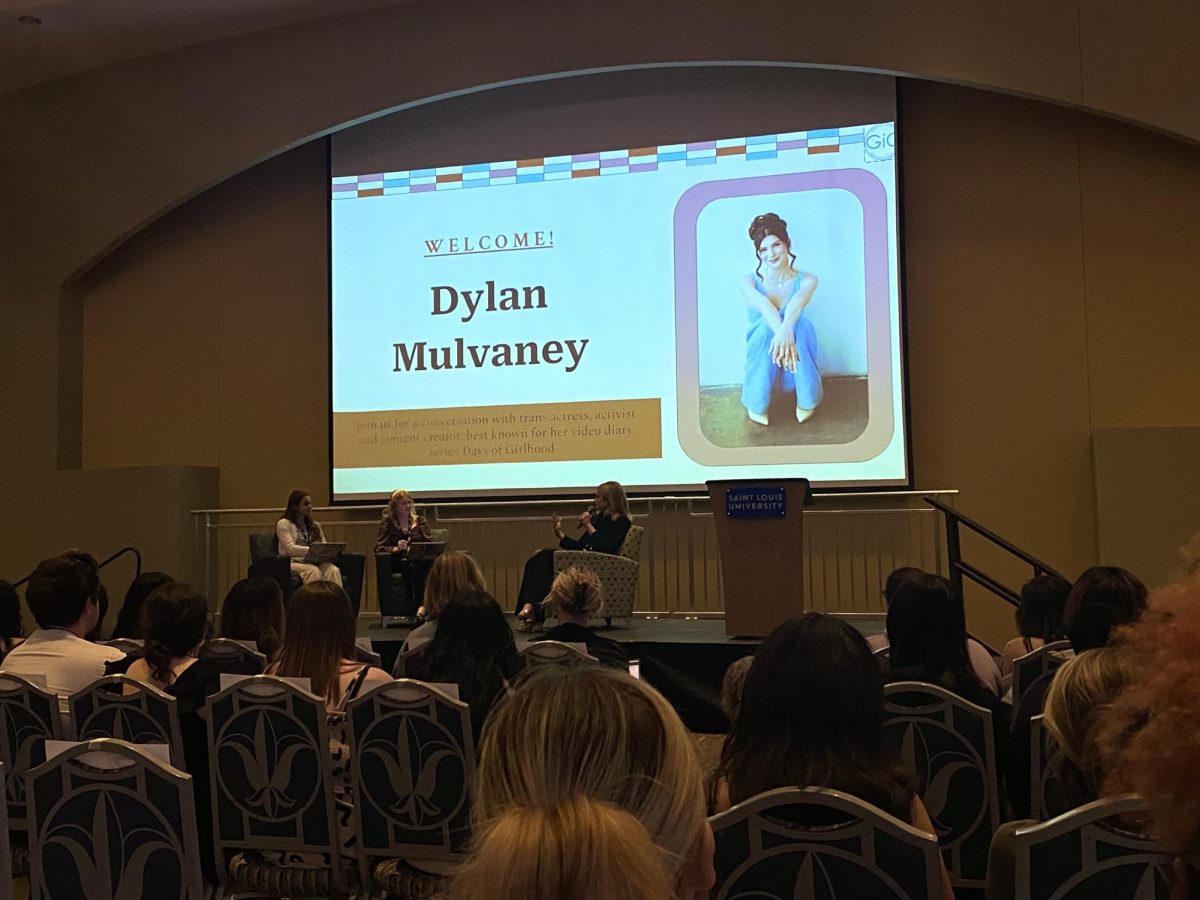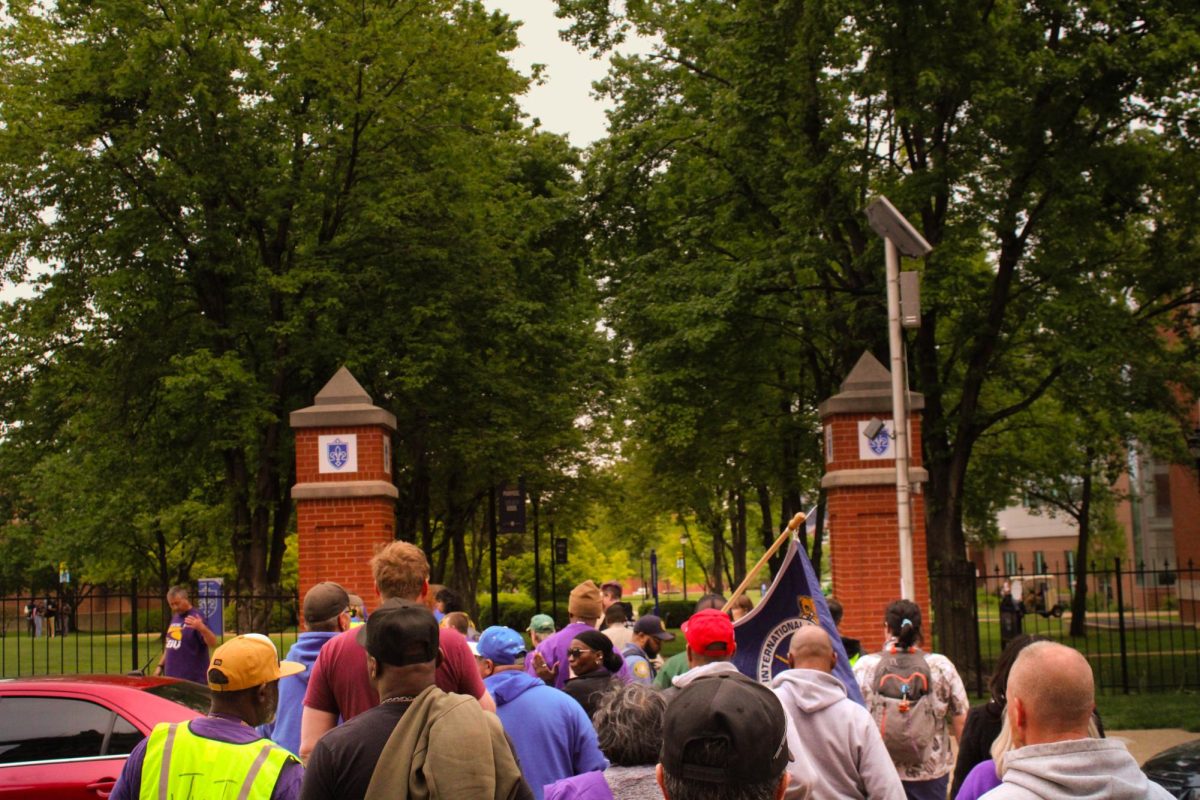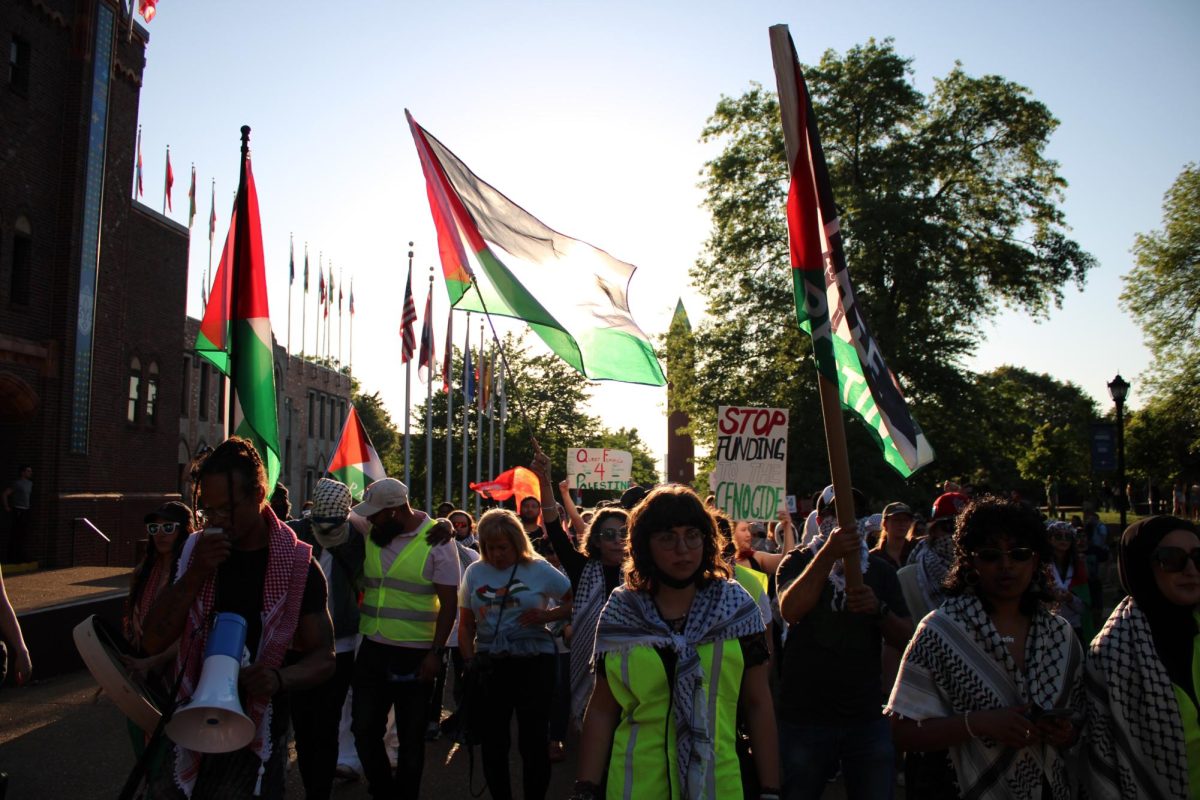The Jesuits of the Missouri Province voted to terminate their Sacred Heart program after 66 years of running, on Nov. 18. Since 1939, the program has touched tens of thousands of radio listeners in the United States and throughout the world.
Today, depending on whom one asks, the program is envisioned in two worlds: the original and the current. Like any piece of history struggling to survive, the program was forced multiple times to adapt to its modern world. Originally, it was a prayer service celebrated nationwide.
Over the years, both American culture and the uniqueness of the Sacred Heart Program have evolved. The program had transformed from a reflection in prayer to a reflection on the average person’s life struggles.
It all began with the vision of the late Reverend Eugene Murphy, S.J., a Saint Louis University Jesuit. Murphy was originally stationed at Rockhurst University. Immediately before transferring to SLU, he was hospitalized due to a virus and temporarily lost his voice. While confined to introspection, Murphy imagined a program to voice the Sacred Heart message. At SLU, he was placed as the superior of scholastics and eventually stumbled upon WEW, the first radio station west of the Mississippi.
By January 1939, Murphy set up his hub with WEW, in their studio on the third floor of Aquinas Hall, and the program was launched. On Jan. 15, St. Louis radio listeners began to tune in. The Jesuits sang their first hymn, and Murphy professed his first devotion to the Sacred Heart. A devotion salient to the Society of Jesuits, or the Jesuits, it exuded honor to the physical heart of Jesus as a symbol of Christ’s love. According to his close friend, Ted Pepple, Murphy conveyed this message on and off the radio.
TED PEPPLE
“Father Murphy’s message was not militant, controversial or divisive. It was love. And it supplemented every church and nonchurch, every home and institution, wherever love was the theme,” said Pepple.
Pepple was experiencing doubt about his career choice when a friend recommended visiting Murphy. A native to St. Louis and its community for only about 10 years, Murphy was a household name. Knowing this, Pepple never expected to sit and talk with this renowned public figure for more than an hour.
“After hearing Murphy’s words, I left confident I was making the right move in my life. The man was a pastor and not a preacher; he gave hope and showed compassion,” said Pepple.
Pepple remembers Murphy using his words to draw in crowds, particularly during World War II when people faced death daily.
Murphy’s words were spoken via a blessing at the end of each 15-minute “Sacred Heart Hour,” following a scripture reading and sermon by another Jesuit. Eventually the program was restructured so that it was prerecorded on vinyl. Records with a week’s worth of programs were sent free of charge out to radio stations outside of Missouri and outside of the country to military bases.
Pepple remembered the positive reaction people gave to the program but did not see that enthusiasm as much today.
“The program waned when it stopped being devotional. Their job wasn’t to talk about homeless shelters and whatnot,” said Pepple.
Pepple showed concern that Murphy’s message was not maintained, and he is not alone. SLU’s Assistant Vice President for Development Father Dennis Daly, S.J., felt the same way.
FATHER DALY
Daly joined the Sacred Heart program team as executive director in 1966. The program started experimenting with television programming. And the recording studio moved to its existing location at Westminster and Vandeventer, and the Catholic Church’s teachings had shifted as a result of the Vatican II Council.
The recent location at the old Victorian mansion was a gift. In 1953, three friends of Murphy donated their house to the Jesuits’ Sacred Heart program. Amelia, Pasqualina and Rosina Guiseffi ?_” three Italian sisters ?_” decided to let go of their dressmaking trade in the mansion, built in 1895 and bought by their brother, Girolamo, in 1905.
In this new location and with a new view of Catholic beliefs, Daly saw the Sacred Heart program in a different context.
“Vatican II asked people to give up the traditions they knew well,” said Daly. Daly felt honored to be in such a position, to provide an opportunity to learn new traditions. He used his newly earned position to relay the new values of the Catholic Church including justice, religious liberty and importance of scripture.
Also in his position of power, Daly recruited celebrities to play in benefit concerts. The Sacred Heart program suffered financially. All the dimes and quarters listeners sent through the mail were not cutting it. Lawrence Welk, Guy Lombardo and Bing Crosby drew crowds at the Sheldon Concert Hall and at the Kiel Center.
Daly said its current mission feeds off “humanism, which is not a part of Scripture at all.” Daly said he thought that the radio industry caused the change in mission. Stations gradually began to focus on types of music instead of particular services, like farming news or national news. The Federal Communications Commission stopped requiring commercial stations to dedicate time to nonprofit programs or messages. The Sacred Heart Program suddenly had a smaller audience and fewer funds.
By the late 1970s, Murphy had passed on, and Daly geared up for resignation. Religious devotional programming, as a whole, was losing its flavor. The Jesuits reconfigured their message and changed the name from “Sacred Heart Program” to “Contact,” its current official title.
“Today, the program features real-life stories from real people dealing with the issues and problems of everyday life,” said Executive Director Gary Kolarcik.
In response to the new mission, Daly said, “Each part of history has a way of expressing itself and doesn’t, after a while.”
Today the Jesuits solely sponsor the program, but its players still hold the program close to their heart, especially current executive producer Trish Muyco.
TRISH MUYCO
Muyco was recruited from KTRS radio and accepted the job. She knew that for once she could tell a story in its entirety and not just with its headline in a 15-second spot.
“At KTRS, I could only say a St. Louis doctor won an award, because he was from St. Louis. At Contact, I was able to interview the plastic surgeon and was able to tell everyone, that as a service, he takes tattoos off gang members for free,” said Muyco.
Muyco still thinks that the program is doing a great service. Three hundred radio stations still take their programs on record because the topics they cover are “relevant and timeless.” Their topics have included the death penalty, stress, satisfaction at work and urban sprawl. And like Murphy’s demeanor, the program aims not to preach but to show compassion and also to mentally stimulate.
“We’re unique. We do not tell people what to do. We let people who are directly affected by an issue speak, so that listeners can identify. Listeners can hear what worked well for those experienced and help themselves,” said Muyco.
Muyco hopes to end the program with gratitude and on an upbeat. The public is invited to attend a mass to celebrate the success of Contact Radio on Nov. 4 at noon, at the Shrine of St. Joseph. Then, for the final show, she plans to investigate and share the origins of Christmas songs.
Along with her co-workers, Muyco hopes to carry out the ministry of the Sacred Heart.
Project Development Coordinator Julia Hart believes that the mission they carried speaks volumes because it “links” people. “Murphy’s values were grounded in love. Our mission transcends politics and speaks to the higher value that all people share, and that is love,” she said.
Spiritual Director Len Kraus, S.J. stated the Jesuits will use the remaining resources of the ministry for an endowment to fund programs to educate the public about Ignatian Spirituality. “The Jesuits thought of a lot of options, to see how [they] could keep the program alive,” he said.
They pulled the plug not because the program was unworthy, said Kraus. “They did not have the budget for professional front-line radio,” he said. “Murphy would understand the struggles we had and would only be disappointed because our program no longer had access.”
The Sacred Heart Program was rooted in prayer and in the life struggles of the average person. On Nov. 18, Murphy’s vision will record its own struggles and rely on the average person to pray and to keep the vision alive. All involved in the 66 years of running agree that the vision is timeless as was Fr. Murphy’s spirit, love and vision.
not cutting it. Lawrence Welk, Guy Lombardo and Bing Crosby drew crowds at the Sheldon Concert Hall and at the Kiel Center.
Daly said its current mission feeds off “humanism, which is not a part of Scripture at all.” Daly said he thought that the radio industry caused the change in mission. Stations gradually began to focus on types of music instead of particular services, like farming news or national news. The Federal Communications Commission stopped requiring commercial stations to dedicate time to nonprofit programs or messages. The Sacred Heart Program suddenly had a smaller audience and fewer funds.
By the late 1970s, Murphy had passed on, and Daly geared up for resignation. Religious devotional programming, as a whole, was losing its flavor. The Jesuits reconfigured their message and changed the name from “Sacred Heart Program” to “Contact,” its current official title.
“Today, the program features real-life stories from real people dealing with the issues and problems of everyday life,” said Executive Director Gary Kolarcik.
In response to the new mission, Daly said, “Each part of history has a way of expressing itself and doesn’t, after a while.”
Today the Jesuits solely sponsor the program, but its players still hold the program close to their heart, especially current executive producer Trish Muyco.
TRISH MUYCO
Muyco was recruited from KTRS radio and accepted the job. She knew that for once she could tell a story in its entirety and not just with its headline in a 15-second spot.
“At KTRS, I could only say a St. Louis doctor won an award, because he was from St. Louis. At ‘Contact,’ I was able to interview the plastic surgeon and was able to tell everyone, that as a service, he takes tattoos off gang members for free,” said Muyco.
Muyco still thinks that the program is doing a great service. Three hundred radio stations still take their programs on record because the topics they cover are “relevant and timeless.” Their topics have included the death penalty, stress, satisfaction at work and urban sprawl. And like Murphy’s demeanor, the program aims not to preach but to show compassion and also to mentally stimulate.
“We’re unique. We do not tell people what to do. We let people who are directly affected by an issue speak, so that listeners can identify. Listeners can hear what worked well for those experienced and help themselves,” said Muyco.
Muyco hopes to end the program with gratitude and on an upbeat. The public is invited to attend a Mass to celebrate the success of Contact Radio on Nov. 4 at noon, at the Shrine of St. Joseph. Then, for the final show, she plans to investigate and share the origins of Christmas songs.
Along with her co-workers, Muyco hopes to carry out the ministry of the Sacred Heart.
Project Development Coordinator Julia Hart believes that the mission they carried speaks volumes because it “links” people. “Murphy’s values were grounded in love. Our mission transcends politics and speaks to the higher value that all people share, and that is love,” she said.
Spiritual Director Len Kraus, S.J. stated the Jesuits will use the remaining resources of the ministry for an endowment to fund programs to educate the public about Ignatian Spirituality. “The Jesuits thought of a lot of options, to see how [they] could keep the program alive,” he said.
They pulled the plug not because the program was unworthy, said Kraus. “They did not have the budget for professional front-line radio,” he said. “Murphy would understand the struggles we had and would only be disappointed because our program no longer had access.”
The Sacred Heart Program was rooted in prayer and in the life struggles of the average person. On Nov. 18, Murphy’s vision will record its own struggles and rely on the average person to pray and to keep the vision alive. All involved in the 66 years of running agree that the vision is timeless as was Fr. Murphy’s spirit, love and vision.






